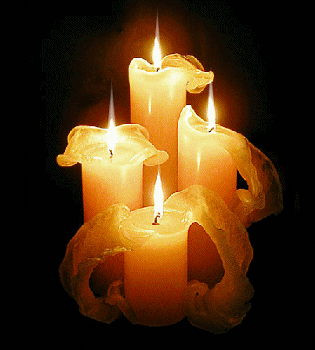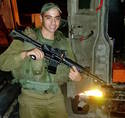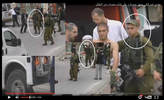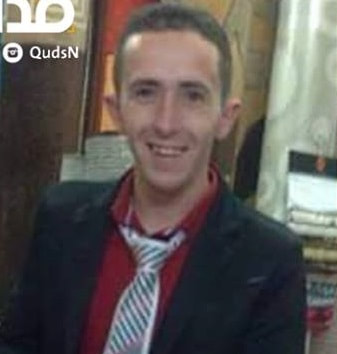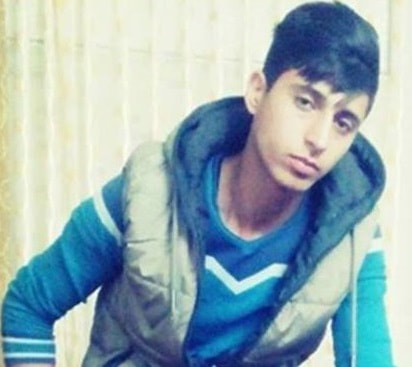25 may 2016
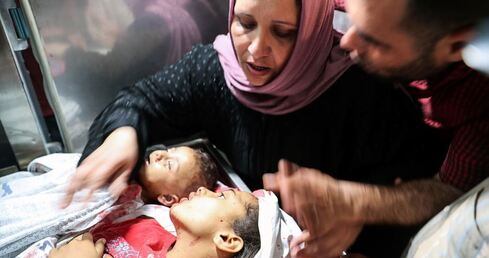
A coalition agreement to bring incoming Army Minister Avigdor Lieberman's Yisrael Beytenu into the Israeli coalition government has been signed on Wednesday morning at the Knesset.
Lieberman, one of Israel's most extremist politicians who publicly supports illegal settlement expansion, will take over as Army chief in place of former military chief Moshe Yaalon, who resigned earlier this week.
Wednesday's official signing of the deal comes after the coalition agreement was finalized during an overnight meeting between Netanyahu, Lieberman and Finance Minister Moshe Kahlon (Kulanu) at Netanyahu's office in occupied Jerusalem.
The Israeli Knesset will reconvene next Monday, when there will likely be a vote, followed by a swearing- in ceremony for Liberman and incoming Immigration and Absorption Minister Sofa Landver. The deal also includes an allocation of nearly NIS 1.5 billion for pensions for disadvantaged retirees.
Last week, Moshe Ya’alon declared his resignation from his ministerial position in the Israeli government and Knesset. In a statement issued Friday morning, Ya'alon said that he took the decision to leave "following the recent conduct" of Netanyahu, and "in light of my lack of faith in him."
The move came after Ya'alon was ousted by Netanyahu in favor of Avigdor Lieberman.
Following the appointment of Lieberman as Army Minister, Israeli right-wing groups sent letters to the new minister calling for expanding settlement construction and banning Palestinian building permits.
Israeli media sources revealed Tuesday that lawyers Itamar Ben-Gvi and Puntus Gofstein called on Lieberman to work for the release of the Israeli soldier who deliberately executed a Palestinian injured young man in al-Khalil.
Other right-wing groups called for stopping the “illegal EU-sponsored Palestinian construction in West Bank”, and expanding settlement construction. Avigdor Lieberman was born to a Russian-speaking family on 5 June 1958 in Kishinev, Soviet Union.
Lieberman and his family immigrated to Israel in 1978. A polarizing figure within Israeli politics, Lieberman is quoted as saying, "I've always been controversial because I offer new ideas. For me to be controversial, I think this is positive."
Lieberman has called for redrawing the border between Israel and the West Bank so that Israel would include large Jewish settlement blocs and the Palestinian state would include large Arab-Israeli population centers. He proposed that Israel's citizens should sign a loyalty oath or lose their right to vote.
In November 2006, Lieberman, who described Arab members of the Knesset that meet with Hamas as "terror collaborators", called for their execution: "World War II ended with the Nuremberg Trials. The heads of the Nazi regime, along with their collaborators, were executed. I hope this will be the fate of the collaborators in the Knesset".
In January 2014, according to Haaretz, Lieberman said he would not support any peace agreement that did not include the exchange of Israeli Arab land and population. Lieberman stated: "I will not support any peace deal that will allow the return of even one Palestinian refugee to Israel."
Lieberman, one of Israel's most extremist politicians who publicly supports illegal settlement expansion, will take over as Army chief in place of former military chief Moshe Yaalon, who resigned earlier this week.
Wednesday's official signing of the deal comes after the coalition agreement was finalized during an overnight meeting between Netanyahu, Lieberman and Finance Minister Moshe Kahlon (Kulanu) at Netanyahu's office in occupied Jerusalem.
The Israeli Knesset will reconvene next Monday, when there will likely be a vote, followed by a swearing- in ceremony for Liberman and incoming Immigration and Absorption Minister Sofa Landver. The deal also includes an allocation of nearly NIS 1.5 billion for pensions for disadvantaged retirees.
Last week, Moshe Ya’alon declared his resignation from his ministerial position in the Israeli government and Knesset. In a statement issued Friday morning, Ya'alon said that he took the decision to leave "following the recent conduct" of Netanyahu, and "in light of my lack of faith in him."
The move came after Ya'alon was ousted by Netanyahu in favor of Avigdor Lieberman.
Following the appointment of Lieberman as Army Minister, Israeli right-wing groups sent letters to the new minister calling for expanding settlement construction and banning Palestinian building permits.
Israeli media sources revealed Tuesday that lawyers Itamar Ben-Gvi and Puntus Gofstein called on Lieberman to work for the release of the Israeli soldier who deliberately executed a Palestinian injured young man in al-Khalil.
Other right-wing groups called for stopping the “illegal EU-sponsored Palestinian construction in West Bank”, and expanding settlement construction. Avigdor Lieberman was born to a Russian-speaking family on 5 June 1958 in Kishinev, Soviet Union.
Lieberman and his family immigrated to Israel in 1978. A polarizing figure within Israeli politics, Lieberman is quoted as saying, "I've always been controversial because I offer new ideas. For me to be controversial, I think this is positive."
Lieberman has called for redrawing the border between Israel and the West Bank so that Israel would include large Jewish settlement blocs and the Palestinian state would include large Arab-Israeli population centers. He proposed that Israel's citizens should sign a loyalty oath or lose their right to vote.
In November 2006, Lieberman, who described Arab members of the Knesset that meet with Hamas as "terror collaborators", called for their execution: "World War II ended with the Nuremberg Trials. The heads of the Nazi regime, along with their collaborators, were executed. I hope this will be the fate of the collaborators in the Knesset".
In January 2014, according to Haaretz, Lieberman said he would not support any peace agreement that did not include the exchange of Israeli Arab land and population. Lieberman stated: "I will not support any peace deal that will allow the return of even one Palestinian refugee to Israel."
23 may 2016
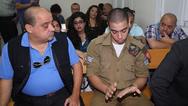
Attorneys submit a plea against manslaughter charges following an incident in which he shot a neutralized terrorist in the head: 'He saw an immediate and real danger to his life and his friends' lives.'
Sgt. Elor Azaria, was charged with manslaughter after shooting dead an already-neutralized terrorist, pleaded not guilty on Monday.
His attorneys - Eyal Beserglick, Ilan Katz, Binyamin Malcha and Karmit Scheiber - submitted their defendant's plea to the Jaffa military court in which they listed a number of points rebutting the idictment charges against him.
In the response to the indictment, Azaria’s attorneys claimed that “The defendant acted in a fraction of a second to neutralize the terrorist to prevent an attack on himself and his friends who were standing close to the terrorist. He did not see any other way to save their lives or his own. The defendant admits that the gun fire may have killed the terrorist but that it definitely neutralized him.”
The plea went on to state that “the defendant saw a situation in which, given the circumstances, the terrorist was wearing an explosive belt and carrying a knife as part of a combined attack and his movements indicated that he intended to detonate the belt on his body which could have had serious consequences.”
This, continued the statement, “was said to the defendant during a briefing. He thought that a real and immediate danger was being posed to him and his friends.”
Moreover, the attorneys sought to draw attention to the circumstances surrounding the terrorist's death. While Azaria acknowledged that the terrorist was moving when he shot at him, the pathological assessment's findings raised important questions. While on the one hand the terrorist's death was caused by Azaria's bullet to the head, "it became apparent that, notwithstanding the shots to the head, the terrorist was shot prior to this which caused the collapse and bleeding of the lung. He also sustained a gunshot wound to the groin.”
The defense team also said in their plea statement that “the report did not answer the question as to whether it could be ruled out as that the shots to the lung and the groin were causes of the terrorist’s death.” Indeed, it highlighted the significant amount of time which elapsed between when the terrorist was first shot and the incident’s conclusion.
During the trial the prosecutor asked about the circumstantial connection between the shooting and the death of the terrorist after the defense claimed that the shooting “may have caused the death of the terrorist.” In response, the defense said that it is investigating the matter using its own pathologist.
On March 24, two terrorists armed with knives stabbed a soldier, moderately wounding him, at an IDF post near the Tel Rumeida neighborhood in Hebron.
The two were shot and neutralized by soldiers from the IDF's Kfir Brigade, and the wounded soldier's condition was later downgraded to light.
A video filmed several minutes later by B'Tselem volunteer Emad abu-Shamsiyah shows one of the terrorists, Abed al Fatah a-Sharif, lying on the ground motionless, when Azaria, who arrived at the scene of the attack several minutes later, aims his weapon at him and shoots him in the head.
An autopsy performed on a-Sharif found he was alive when he was shot, and died as a result of the shot to the head - not from the wounds he sustained before.
Initial investigations showed that Azaria shot the terrorist six minutes after the attack even though soldiers from another unit had already neutralized him. Two of the unit commanders were reprimanded for their failure to treat the terrorist and their failure to remove him from the scene of the attack.
According to a central command general, Azaria took it upon himself to open fire. Moreover, the indictment handed down to him was unequivocal when it stated that “the terrorist was left lying on the ground and was still alive. He posed no immediate or real threat to civilian lives or the soldiers around him.”
Sgt. Elor Azaria, was charged with manslaughter after shooting dead an already-neutralized terrorist, pleaded not guilty on Monday.
His attorneys - Eyal Beserglick, Ilan Katz, Binyamin Malcha and Karmit Scheiber - submitted their defendant's plea to the Jaffa military court in which they listed a number of points rebutting the idictment charges against him.
In the response to the indictment, Azaria’s attorneys claimed that “The defendant acted in a fraction of a second to neutralize the terrorist to prevent an attack on himself and his friends who were standing close to the terrorist. He did not see any other way to save their lives or his own. The defendant admits that the gun fire may have killed the terrorist but that it definitely neutralized him.”
The plea went on to state that “the defendant saw a situation in which, given the circumstances, the terrorist was wearing an explosive belt and carrying a knife as part of a combined attack and his movements indicated that he intended to detonate the belt on his body which could have had serious consequences.”
This, continued the statement, “was said to the defendant during a briefing. He thought that a real and immediate danger was being posed to him and his friends.”
Moreover, the attorneys sought to draw attention to the circumstances surrounding the terrorist's death. While Azaria acknowledged that the terrorist was moving when he shot at him, the pathological assessment's findings raised important questions. While on the one hand the terrorist's death was caused by Azaria's bullet to the head, "it became apparent that, notwithstanding the shots to the head, the terrorist was shot prior to this which caused the collapse and bleeding of the lung. He also sustained a gunshot wound to the groin.”
The defense team also said in their plea statement that “the report did not answer the question as to whether it could be ruled out as that the shots to the lung and the groin were causes of the terrorist’s death.” Indeed, it highlighted the significant amount of time which elapsed between when the terrorist was first shot and the incident’s conclusion.
During the trial the prosecutor asked about the circumstantial connection between the shooting and the death of the terrorist after the defense claimed that the shooting “may have caused the death of the terrorist.” In response, the defense said that it is investigating the matter using its own pathologist.
On March 24, two terrorists armed with knives stabbed a soldier, moderately wounding him, at an IDF post near the Tel Rumeida neighborhood in Hebron.
The two were shot and neutralized by soldiers from the IDF's Kfir Brigade, and the wounded soldier's condition was later downgraded to light.
A video filmed several minutes later by B'Tselem volunteer Emad abu-Shamsiyah shows one of the terrorists, Abed al Fatah a-Sharif, lying on the ground motionless, when Azaria, who arrived at the scene of the attack several minutes later, aims his weapon at him and shoots him in the head.
An autopsy performed on a-Sharif found he was alive when he was shot, and died as a result of the shot to the head - not from the wounds he sustained before.
Initial investigations showed that Azaria shot the terrorist six minutes after the attack even though soldiers from another unit had already neutralized him. Two of the unit commanders were reprimanded for their failure to treat the terrorist and their failure to remove him from the scene of the attack.
According to a central command general, Azaria took it upon himself to open fire. Moreover, the indictment handed down to him was unequivocal when it stated that “the terrorist was left lying on the ground and was still alive. He posed no immediate or real threat to civilian lives or the soldiers around him.”
17 may 2016
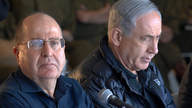
Political officials say that while the two settled their differences over comments Ya'alon made on Sunday, there is still mistrust between him and Netanyahu; 'They didn't agree to turn over a new leaf.'
Despite announcing they have "settled their differences," political officials said on Monday night there were still tensions between Prime Minister Benjamin Netanyahu and Defense Minister Moshe Ya'alon.
Netanyahu summoned Ya'alon for an urgent meeting on Monday morning to rebuke him after the defense minister on Sunday encouraged top military generals to continue speaking their mind in public, even if their comments contradict government sentiments.
The Prime Minister's Office viewed Ya'alon's comments as criticism of Netanyahu and other senior ministers who slammed comments made by IDF deputy chief, Maj.-Gen. Yair Golan, who compared recent trends in Israeli society to the atmosphere in Nazi-era Germany. Netanyahu called Golan's statement, made in a speech marking Holocaust Remembrance Day, "outrageous," while Ya'alon supported the general's right to speak.
The meeting at the prime minister's official residence in Jerusalem began at 9am Monday morning. According to political officials, the tense atmosphere soon eased as the two began to exchange clarifications.
According to these officials, Netanyahu believes that Ya'alon is trying to create the impression that he is the only one among the senior Likud members to defend and support the IDF and is laying down the groundwork to unseat Netanyahu in a future run for the party leadership.
But Ya'alon, who went through the text of his speech with Netanyahu during their meeting, stressed that he was not referring to Golan's comments, but rather to the controversy over Sgt. Elor Azaria, who was charged with manslaughter after shooting dead and already-neutralized terrorist in Hebron. Ya'alon told the prime minister that he was not trying to encourage IDF officers to come out against the political echelon.
And so the two set out to word a joint statement declaring the issue resolved. "Prime Minister Netanyahu and Defense Minister Ya'alon met Monday morning and have settled their differences," the statement said. "There is no objection and there has been no objection that the IDF is subject to the political leadership, and that IDF officers are free to say their opinions in relevant forums."
But political officials said that while this issue has been resolved, the relations between Netanyahu and Ya'alon are far from being good. "This isn't a Sulha (reconciliation ceremony—ed.)," the officials said. "This issue has been resolved, but they didn't agree to turn over a new leaf, and the tensions between them remain."
The mistrust between the two sides was evident on Monday when, while the meeting itself had ended at 10am, the arguments over the wording of the joint statement continued until 1pm. During that time, a rumor began to take flight that Netanyahu had fired Ya'alon.
Despite announcing they have "settled their differences," political officials said on Monday night there were still tensions between Prime Minister Benjamin Netanyahu and Defense Minister Moshe Ya'alon.
Netanyahu summoned Ya'alon for an urgent meeting on Monday morning to rebuke him after the defense minister on Sunday encouraged top military generals to continue speaking their mind in public, even if their comments contradict government sentiments.
The Prime Minister's Office viewed Ya'alon's comments as criticism of Netanyahu and other senior ministers who slammed comments made by IDF deputy chief, Maj.-Gen. Yair Golan, who compared recent trends in Israeli society to the atmosphere in Nazi-era Germany. Netanyahu called Golan's statement, made in a speech marking Holocaust Remembrance Day, "outrageous," while Ya'alon supported the general's right to speak.
The meeting at the prime minister's official residence in Jerusalem began at 9am Monday morning. According to political officials, the tense atmosphere soon eased as the two began to exchange clarifications.
According to these officials, Netanyahu believes that Ya'alon is trying to create the impression that he is the only one among the senior Likud members to defend and support the IDF and is laying down the groundwork to unseat Netanyahu in a future run for the party leadership.
But Ya'alon, who went through the text of his speech with Netanyahu during their meeting, stressed that he was not referring to Golan's comments, but rather to the controversy over Sgt. Elor Azaria, who was charged with manslaughter after shooting dead and already-neutralized terrorist in Hebron. Ya'alon told the prime minister that he was not trying to encourage IDF officers to come out against the political echelon.
And so the two set out to word a joint statement declaring the issue resolved. "Prime Minister Netanyahu and Defense Minister Ya'alon met Monday morning and have settled their differences," the statement said. "There is no objection and there has been no objection that the IDF is subject to the political leadership, and that IDF officers are free to say their opinions in relevant forums."
But political officials said that while this issue has been resolved, the relations between Netanyahu and Ya'alon are far from being good. "This isn't a Sulha (reconciliation ceremony—ed.)," the officials said. "This issue has been resolved, but they didn't agree to turn over a new leaf, and the tensions between them remain."
The mistrust between the two sides was evident on Monday when, while the meeting itself had ended at 10am, the arguments over the wording of the joint statement continued until 1pm. During that time, a rumor began to take flight that Netanyahu had fired Ya'alon.
15 may 2016

Prime minister and defense minister go head to head in public exchange of remarks regarding the IDF; Ya'alon urges army chiefs: 'Follow your human conscience and compass, not where the wind blows'; PMO: 'The IDF is the army of the people, and should be kept out of political disputes.'
Prime Minister Benjamin Netanyahu summoned Defense Minister Moshe Ya'alon to his office on Monday for a "clarification meeting" after the two came head to head on Sunday evening in a public exchange of remarks regarding the IDF.
Speaking to the IDF's top brass, including the IDF chief and other generals, Ya'alon urged the military leadership to "continue acting according to human conscience and compass, rather than follow the direction the wind blows."
While the defense minister was still speaking at the ceremony in the Kirya Army Headquarters in Tel Aviv, the Prime Minister's Office released a statement saying "Prime Minister Benjamin Netanyahu gives his full backing to the IDF, its commanders and soldiers.
The PMO statement went on to further condemn a controversial statement made by Deputy IDF Chief Yair Golan on the eve of Holocaust Remembrance Day, noting that "the prime minister remains steadfast in his opinion that the comparison (of events unfolding in Israel) to Nazi Germany was inappropriate, made at an inappropriate time, and caused Israel damage on the international stage. The IDF's commanders freely speak their minds—in relevant forums and on topics under their purview. The IDF is the army of the people, and should be kept out of political disputes."
Several high-ranked IDF officers have recently found themselves under criticism, the most recent of which was the IDF deputy chief of staff, Maj.-Gen. Yair Golan, who warned at a ceremony on the eve of Holocaust Remembrance Day of processes that happened in Germany of the 1920s and 1930s, which he now sees happening in Israel today.
If there is something that frightens me about the memory of the Holocaust, it is seeing the abhorrent processes that took place in Europe, and Germany in particular, some 70, 80 or 90 years ago, and finding manifestations of these processes here among us in 2016,” Golan said at the Masua Holocaust Institute in Tel Yitzhak.
Golan's speech was met with scathing criticism from all directions, including from the prime minister himself who condemned the comparison made by the deputy IDF chief as "outrageous" and noted the remarks "wrong Israeli society and cheapen the Holocaust."
The defense minister and prime minister have also found themselves at odds over Sgt. Elor Azaria, who was charged with manslaughter after shooting dead an already-neutralized terrorist in Hebron.
While the defense minister and the top military ranks condemned the incident and called to bring the soldier to justice, the prime minister called the soldier's father to offer words of support.
"A good army is one whose commanders, both junior and senior, feel confident in their ability to speak their minds at any given time, knowing they will not suffer for it," Ya'alon said on Sunday evening.
"Do not fear, do not hesitate, do not be deterred. Continue to be brave not just on the battle field, but also around the discussions table. Keep speaking your mind. Do so even if what you have to say is not in line with the consensus, and even if it disputes ideas and positions that the senior command or the political echelons adopted. This is my demand from you, senior IDF commanders, and this should be your demand of your subordinates."
Ya'alon warned that "over the past few months, we have found ourselves fighting against an extremist minority that acts both on the ground and on social media. A part of this fringe group also made its way to the mainstream, under cover and guise, and is trying to influence the character and values of the IDF."
"This is a significant struggle like no other, perhaps the most vital and important one in many years," Ya'alon said. "Not just over the character of the IDF, but also the character of Israeli society. The continued undermining of the moral and ethical strength of the IDF and of Israeli society will be disastrous for the State of Israel. I will admit to you that the issue has caused me to lose sleep, but it also makes me determined to win this battle. As someone who received the world and all that is in it from the IDF, and acknowledges the importance of safeguarding its values, I have no intention to back down on the matter. For me, and I know that for you as well, this is my true mission."
Ya'alon went on to claim that "this isn't a matter of right-wing or left-wing, as the sane majority in Israeli society, across the political spectrum, seeks to keep the IDF as a moral army, and its soldiers and commanders as moral and humane. They are indeed moral, and if there are any who deviate from these norms—we know how to deal with them, and will not allow soldiers to be trigger-happy, inciting and vengeful, or to lose their senses. We will back anyone who innocently errs, but will show no tolerance to those who digress from their authority and act in contravention of the law and our values."
Ya'alon argued that having an ethical and moral army was "first and foremost, before the advanced weapons and accurate intelligence, the guarantee to our security."
He said that "the IDF imbibes from Israeli society, and Israeli society imbibes from the IDF. The mutual influence makes you, the commanders, into educational figures as well: Those who know how to use force when necessarily, but also understand the limitations of that force; those who maintain humility, integrity and honesty, and do not allow arrogance to have command of their agenda. The IDF was and remains the central melting pot of the State of Israel, and as such we must protect and preserve it, and not allow violent and inciting elements, or those who influence soldiers, into it."
Prime Minister Benjamin Netanyahu summoned Defense Minister Moshe Ya'alon to his office on Monday for a "clarification meeting" after the two came head to head on Sunday evening in a public exchange of remarks regarding the IDF.
Speaking to the IDF's top brass, including the IDF chief and other generals, Ya'alon urged the military leadership to "continue acting according to human conscience and compass, rather than follow the direction the wind blows."
While the defense minister was still speaking at the ceremony in the Kirya Army Headquarters in Tel Aviv, the Prime Minister's Office released a statement saying "Prime Minister Benjamin Netanyahu gives his full backing to the IDF, its commanders and soldiers.
The PMO statement went on to further condemn a controversial statement made by Deputy IDF Chief Yair Golan on the eve of Holocaust Remembrance Day, noting that "the prime minister remains steadfast in his opinion that the comparison (of events unfolding in Israel) to Nazi Germany was inappropriate, made at an inappropriate time, and caused Israel damage on the international stage. The IDF's commanders freely speak their minds—in relevant forums and on topics under their purview. The IDF is the army of the people, and should be kept out of political disputes."
Several high-ranked IDF officers have recently found themselves under criticism, the most recent of which was the IDF deputy chief of staff, Maj.-Gen. Yair Golan, who warned at a ceremony on the eve of Holocaust Remembrance Day of processes that happened in Germany of the 1920s and 1930s, which he now sees happening in Israel today.
If there is something that frightens me about the memory of the Holocaust, it is seeing the abhorrent processes that took place in Europe, and Germany in particular, some 70, 80 or 90 years ago, and finding manifestations of these processes here among us in 2016,” Golan said at the Masua Holocaust Institute in Tel Yitzhak.
Golan's speech was met with scathing criticism from all directions, including from the prime minister himself who condemned the comparison made by the deputy IDF chief as "outrageous" and noted the remarks "wrong Israeli society and cheapen the Holocaust."
The defense minister and prime minister have also found themselves at odds over Sgt. Elor Azaria, who was charged with manslaughter after shooting dead an already-neutralized terrorist in Hebron.
While the defense minister and the top military ranks condemned the incident and called to bring the soldier to justice, the prime minister called the soldier's father to offer words of support.
"A good army is one whose commanders, both junior and senior, feel confident in their ability to speak their minds at any given time, knowing they will not suffer for it," Ya'alon said on Sunday evening.
"Do not fear, do not hesitate, do not be deterred. Continue to be brave not just on the battle field, but also around the discussions table. Keep speaking your mind. Do so even if what you have to say is not in line with the consensus, and even if it disputes ideas and positions that the senior command or the political echelons adopted. This is my demand from you, senior IDF commanders, and this should be your demand of your subordinates."
Ya'alon warned that "over the past few months, we have found ourselves fighting against an extremist minority that acts both on the ground and on social media. A part of this fringe group also made its way to the mainstream, under cover and guise, and is trying to influence the character and values of the IDF."
"This is a significant struggle like no other, perhaps the most vital and important one in many years," Ya'alon said. "Not just over the character of the IDF, but also the character of Israeli society. The continued undermining of the moral and ethical strength of the IDF and of Israeli society will be disastrous for the State of Israel. I will admit to you that the issue has caused me to lose sleep, but it also makes me determined to win this battle. As someone who received the world and all that is in it from the IDF, and acknowledges the importance of safeguarding its values, I have no intention to back down on the matter. For me, and I know that for you as well, this is my true mission."
Ya'alon went on to claim that "this isn't a matter of right-wing or left-wing, as the sane majority in Israeli society, across the political spectrum, seeks to keep the IDF as a moral army, and its soldiers and commanders as moral and humane. They are indeed moral, and if there are any who deviate from these norms—we know how to deal with them, and will not allow soldiers to be trigger-happy, inciting and vengeful, or to lose their senses. We will back anyone who innocently errs, but will show no tolerance to those who digress from their authority and act in contravention of the law and our values."
Ya'alon argued that having an ethical and moral army was "first and foremost, before the advanced weapons and accurate intelligence, the guarantee to our security."
He said that "the IDF imbibes from Israeli society, and Israeli society imbibes from the IDF. The mutual influence makes you, the commanders, into educational figures as well: Those who know how to use force when necessarily, but also understand the limitations of that force; those who maintain humility, integrity and honesty, and do not allow arrogance to have command of their agenda. The IDF was and remains the central melting pot of the State of Israel, and as such we must protect and preserve it, and not allow violent and inciting elements, or those who influence soldiers, into it."
9 may 2016

Jaffa Military Court urges both sides engage in mediation in attempt to reach plea bargain in case of Sergeant Elor Azaria, who is charged with manslaughter.
"The soldier took several steps towards the terrorists, aimed at his head and fired a single bullet from short range. This the defendant did in contravention of the rules of engagement and without operational justification," the indictment said. It said the Palestinian, Abdel-Fattah al-Sharif, "did not present a clear and present threat" and that "the defendant caused the death of the terrorist al-Sharif illegally."
Azaria was charged with manslaughter and inpporpriate military conduct last month at the Jaffa Military Court. Military prosecutors said that with no proof of premeditation, they had opted to indict Azaria for manslaughter instead of murder. If convicted, he could face up to 20 years in prison.
The president of Jaffa Military Court, Colonel Maya Heller, military judge Lt. Col. Carmel Wahabi and Judge Lt. Col. Yogev Yifrach, urged the sides to seek a plea bargain over the next week.
Heller also rejected Azaria's request to be allowed out of detention to celebrate Independence Day.
The incident occurred on March 24, when two terrorists armed with knives stabbed a soldier, moderately wounding him, at an IDF post near the Tel Rumeida neighborhood in Hebron. One of the terrorists was shot dead, but the second, Abed al Fatah a-Sharif, was neutralized and lay wounded on the ground.
A video filmed several minutes later by B'Tselem shows Azaria shooting the neutralized terrorist in the head. An autopsy, attended by both an Israeli and a Palestinian pathologist, showed it was Azaria's bullet that killed him.
Azaria, a conscript medic, is the first active duty Israeli soldier to face criminal proceedings over the alleged illegal use of lethal force since the violence erupted in October.
But with the IDF chief urging soldiers to use only "measured and considered force" in dealing with attackers, an opinion poll found that 57 percent of Israelis believe Azaria should never have been arrested.
Two months ago, after far-right ministers in his governing coalition cautioned against what they dismissed as a show trial, Prime Minister Benjamin Netanyahu took the unusual step of telephoning the conscript's father to say "I understand your distress" and promising his son would be treated fairly.
"The truth will come out. The path will be long. We will endure," said defense lawyer Binyamin Malka. The soldier's defense team has said he acted appropriately and that it is seeking full acquittal.
According to the military, Azaria told investigators he believed the Palestinian, though subdued, may have had a suicide explosive belt and that he still posed a danger.
Prosecutor Lt.-Col. Adoram Rigler said at the court hearing last April that "the terrorist who was shot by the soldier did not pose a risk to him or to anyone around him. There is a strong evidentiary basis to prove the indictment."
The defense, meanwhile, claimed that “The testimony and evidence ruled out a vengeful motive for the shooting. The pathologist said she cannot rule out that the terrorist might have moved his hands.”
Trial of Hebron soldier who shot neutralized terrorist to begin
Sergeant Elor Azaria, charged with manslaughter for the shooting which occurred last March, is tried at Jaffa Military Court; Court suggests both sides engage in mediation.
The trial of Sergeant Elor Azaria, the Kfir Brigade soldier who shot dead an already-neutralized terrorist in Hebron last March, began Monday morning at Jaffa Military Court, with the accused being read his indictment.
"The soldier took several steps towards the terrorists, aimed at his head and fired a single bullet from short range. This the defendant did in contravention of the rules of engagement and without operational justification," the indictment said.
Azaria was charged with manslaughter and inpporpriate behavior last month at the Jaffa Military Court.
President of Jaffa Military Court, Colonel Maya Heller, military judge Lt. Col. Carmel Wahabi and Judge Lt. Col. Yogev Yifrah, ordered the prosecution to file a reply within one week a response to the request for mediation in the case.
Heller also ruled: "There are no reasons that justify the soldier's leaving detention for Independence Day, as he requested, therefore we reject this request."
The judge criticized both the defense and the prosecution and warned of the weakness of the evidence against Azaria.
The incident occurred on March 24, when two terrorists armed with knives stabbed a soldier, moderately wounding him, at an IDF post near the Tel Rumeida neighborhood in Hebron. One of the terrorists was shot dead, but the second, Abed al Fatah a-Sharif, was neutralized and lay wounded on the ground.
A video filmed several minutes later by B'Tselem shows Azaria shooting the neutralized terrorist in the head.
Prosecutor Lt.-Col. Adoram Rigler said at the court hearing last April that "the terrorist who was shot by the soldier did not pose a risk to him or to anyone around him. There is a strong evidentiary basis to prove the indictment."
The defense, meanwhile, claimed that “The testimony and evidence ruled out a vengeful motive for the shooting. The pathologist said she cannot rule out that the terrorist might have moved his hands.”
"The soldier took several steps towards the terrorists, aimed at his head and fired a single bullet from short range. This the defendant did in contravention of the rules of engagement and without operational justification," the indictment said. It said the Palestinian, Abdel-Fattah al-Sharif, "did not present a clear and present threat" and that "the defendant caused the death of the terrorist al-Sharif illegally."
Azaria was charged with manslaughter and inpporpriate military conduct last month at the Jaffa Military Court. Military prosecutors said that with no proof of premeditation, they had opted to indict Azaria for manslaughter instead of murder. If convicted, he could face up to 20 years in prison.
The president of Jaffa Military Court, Colonel Maya Heller, military judge Lt. Col. Carmel Wahabi and Judge Lt. Col. Yogev Yifrach, urged the sides to seek a plea bargain over the next week.
Heller also rejected Azaria's request to be allowed out of detention to celebrate Independence Day.
The incident occurred on March 24, when two terrorists armed with knives stabbed a soldier, moderately wounding him, at an IDF post near the Tel Rumeida neighborhood in Hebron. One of the terrorists was shot dead, but the second, Abed al Fatah a-Sharif, was neutralized and lay wounded on the ground.
A video filmed several minutes later by B'Tselem shows Azaria shooting the neutralized terrorist in the head. An autopsy, attended by both an Israeli and a Palestinian pathologist, showed it was Azaria's bullet that killed him.
Azaria, a conscript medic, is the first active duty Israeli soldier to face criminal proceedings over the alleged illegal use of lethal force since the violence erupted in October.
But with the IDF chief urging soldiers to use only "measured and considered force" in dealing with attackers, an opinion poll found that 57 percent of Israelis believe Azaria should never have been arrested.
Two months ago, after far-right ministers in his governing coalition cautioned against what they dismissed as a show trial, Prime Minister Benjamin Netanyahu took the unusual step of telephoning the conscript's father to say "I understand your distress" and promising his son would be treated fairly.
"The truth will come out. The path will be long. We will endure," said defense lawyer Binyamin Malka. The soldier's defense team has said he acted appropriately and that it is seeking full acquittal.
According to the military, Azaria told investigators he believed the Palestinian, though subdued, may have had a suicide explosive belt and that he still posed a danger.
Prosecutor Lt.-Col. Adoram Rigler said at the court hearing last April that "the terrorist who was shot by the soldier did not pose a risk to him or to anyone around him. There is a strong evidentiary basis to prove the indictment."
The defense, meanwhile, claimed that “The testimony and evidence ruled out a vengeful motive for the shooting. The pathologist said she cannot rule out that the terrorist might have moved his hands.”
Trial of Hebron soldier who shot neutralized terrorist to begin
Sergeant Elor Azaria, charged with manslaughter for the shooting which occurred last March, is tried at Jaffa Military Court; Court suggests both sides engage in mediation.
The trial of Sergeant Elor Azaria, the Kfir Brigade soldier who shot dead an already-neutralized terrorist in Hebron last March, began Monday morning at Jaffa Military Court, with the accused being read his indictment.
"The soldier took several steps towards the terrorists, aimed at his head and fired a single bullet from short range. This the defendant did in contravention of the rules of engagement and without operational justification," the indictment said.
Azaria was charged with manslaughter and inpporpriate behavior last month at the Jaffa Military Court.
President of Jaffa Military Court, Colonel Maya Heller, military judge Lt. Col. Carmel Wahabi and Judge Lt. Col. Yogev Yifrah, ordered the prosecution to file a reply within one week a response to the request for mediation in the case.
Heller also ruled: "There are no reasons that justify the soldier's leaving detention for Independence Day, as he requested, therefore we reject this request."
The judge criticized both the defense and the prosecution and warned of the weakness of the evidence against Azaria.
The incident occurred on March 24, when two terrorists armed with knives stabbed a soldier, moderately wounding him, at an IDF post near the Tel Rumeida neighborhood in Hebron. One of the terrorists was shot dead, but the second, Abed al Fatah a-Sharif, was neutralized and lay wounded on the ground.
A video filmed several minutes later by B'Tselem shows Azaria shooting the neutralized terrorist in the head.
Prosecutor Lt.-Col. Adoram Rigler said at the court hearing last April that "the terrorist who was shot by the soldier did not pose a risk to him or to anyone around him. There is a strong evidentiary basis to prove the indictment."
The defense, meanwhile, claimed that “The testimony and evidence ruled out a vengeful motive for the shooting. The pathologist said she cannot rule out that the terrorist might have moved his hands.”
